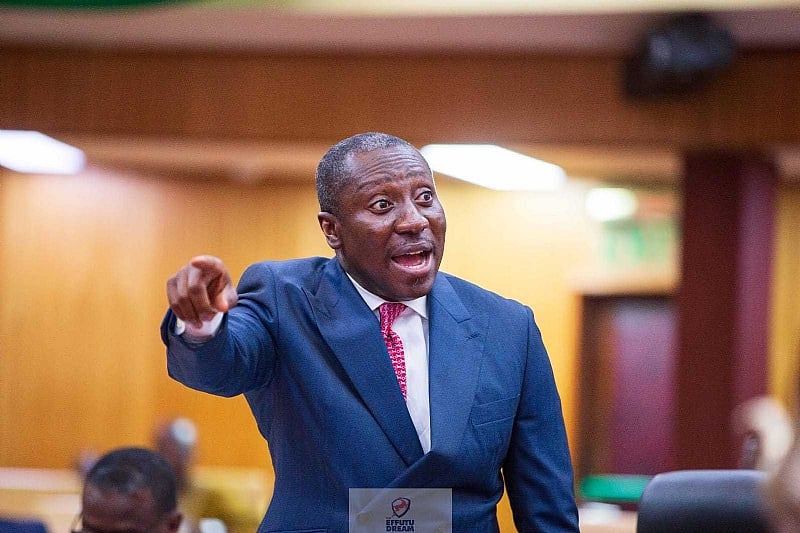
We Lost the Middle Class to Haircuts - Afenyo Markin
Oct 28, 2025
by Ekow Benyah Oct 28, 2025

October 28, 2025
Minority Leader Alexander Afenyo-Markin has made a candid admission that the New Patriotic Party (NPP) lost the critical support of Ghana's middle class due to tough economic decisions, including the controversial financial sector haircut that affected pensioners and investors.
Speaking in an interview monitored by vistanewsgh.com on October 27, the Effutu MP acknowledged that austerity measures implemented to stabilize Ghana's economy alienated many of the party's core supporters, including professionals, business owners, and educated voters who traditionally backed the NPP.
"We lost the middle class, our own base, the businessmen, because there was some haircut… pensioners, educated people who ordinarily would vote NPP got disappointed," Afenyo-Markin stated.
In a particularly striking example, the Minority Leader referenced the public outcry from a former Chief Justice appointed by the NPP administration who was forced to join street protests over pension-related grievances.
"To the extent that a former Chief Justice, appointed by our own administration, was on the streets fighting for her pension — it's understandable," he said, acknowledging the depth of frustration even among the party's most prominent appointees.
Afenyo-Markin defended the controversial decisions as necessary responses to a global economic crisis that required immediate action to prevent economic collapse.
"We were faced with some huge challenges. We tried, but we were not too successful," he admitted frankly. "In stabilising the economy, certain hard decisions had to be taken."
The financial sector haircut, which reduced the value of investments and affected pensioners' savings, was part of broader austerity measures implemented under Ghana's economic recovery programme.
Despite acknowledging the political damage, the Minority Leader emphasized the NPP's policy achievements, particularly in social intervention programs. He highlighted several flagship initiatives:
"Ours is to create a platform to build the human resource capacity of the Ghanaian people. We did that successfully," Afenyo-Markin asserted.
In a direct challenge to the current governing National Democratic Congress (NDC), Afenyo-Markin claimed that the opposition party has failed to introduce comparable social intervention policies since 1992.
"Recently in Parliament, I challenged the Majority Leader to name a single social intervention policy the NDC has initiated and implemented successfully since 1992. They have zero," he said.
The Minority Leader drew on his own experience to illustrate the importance of educational support programs. He revealed that he nearly dropped out of St. Augustine's College until he received a bursary introduced by Dr. Paa Kwesi Nduom.
"But for that bursary, I would have dropped out," Afenyo-Markin recalled, adding that policies like Free SHS have provided similar hope and opportunities to thousands of young Ghanaians who might otherwise have been unable to complete their education.
Despite the acknowledgment of electoral losses and disappointed supporters, Afenyo-Markin insisted that the NPP must continue to highlight its achievements and not shy away from its record.
"In spite of all these disappointments, we should still let the Ghanaian people know the good things we did," he stated. "We shouldn't shy away from our success stories."
Afenyo-Markin's admission highlights a critical challenge facing governments across Africa and globally: the political cost of economic stabilization measures. The NPP's experience demonstrates how austerity policies, while potentially necessary for macroeconomic stability, can alienate core supporters and erode electoral support.
The financial sector haircut, which affected bondholders and pensioners who had invested their savings in government securities, became particularly controversial as it impacted educated, middle-class Ghanaians—traditionally a key NPP constituency.
The Minority Leader's frank assessment comes as Ghana continues to navigate its economic recovery and as political parties position themselves for future elections. His comments suggest a recognition within the NPP that economic management alone, without adequate protection of middle-class interests, may not be sufficient to maintain political support.
The admission also raises questions about how future governments will balance fiscal responsibility with the need to protect vulnerable groups, including pensioners and small investors, during economic crises.
Afenyo-Markin's comments were made in his capacity as Minority Leader, with the NPP currently in opposition following their electoral defeat. His candid reflection on the party's challenges may be part of a broader effort to rebuild trust with alienated supporters while defending the party's overall policy record.
The Minority Leader has been actively engaged in parliamentary debates and public discussions about Ghana's economic direction, often defending the NPP's legacy while critiquing current government policies.

Oct 28, 2025

Mar 16, 2025

15 hours ago

Mar 09, 2025